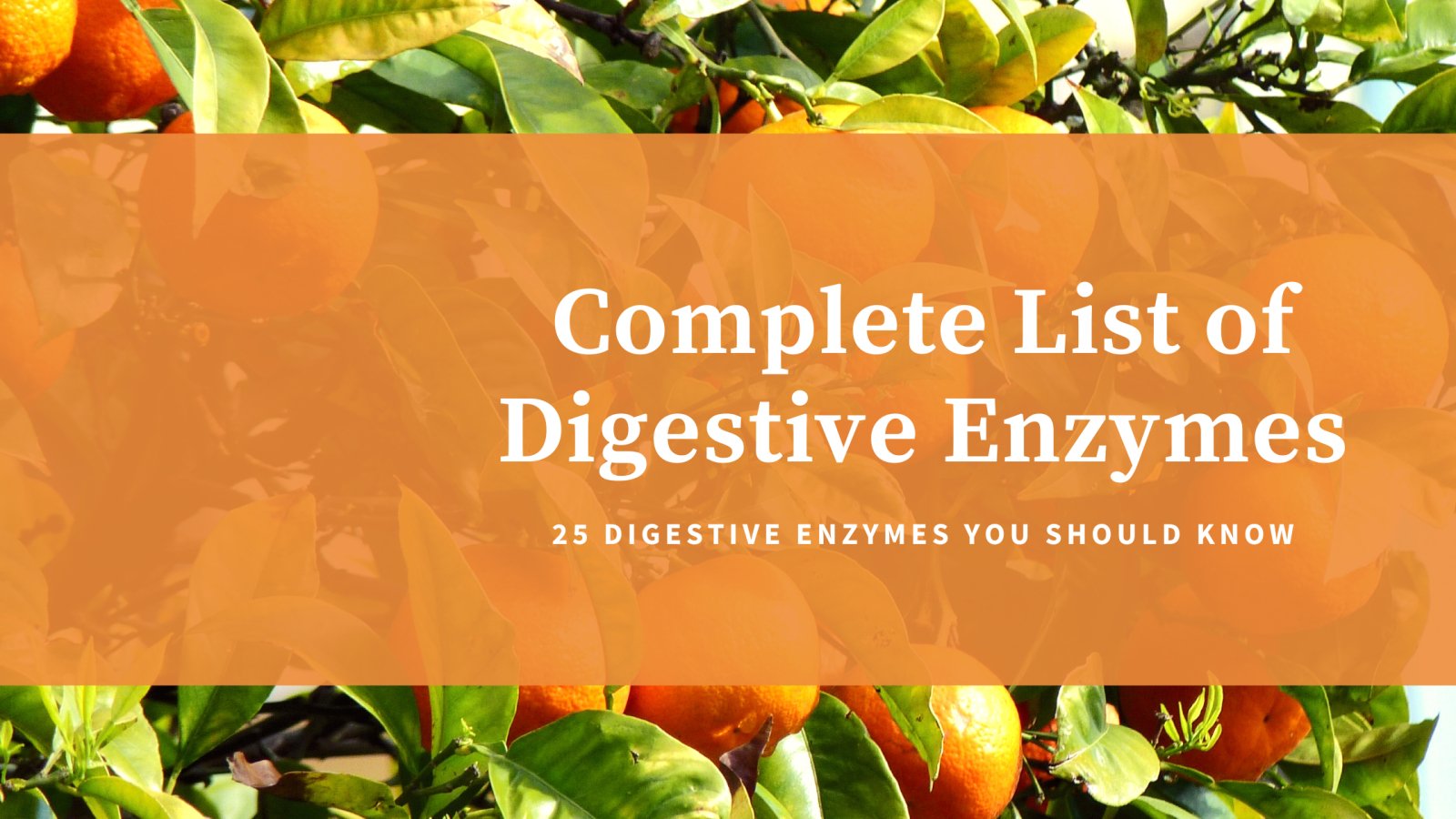Digestive enzymes are specialized proteins that facilitate the breakdown of large food molecules into smaller, more manageable components. They are produced by various organs and tissues throughout our digestive system.
Here is a complete list of digestive enzymes along with their respective functions:
1. Amylase
Amylase is an enzyme responsible for the breakdown of complex carbohydrates into simple sugars. It is primarily produced in the salivary glands and pancreas. This enzyme initiates digestion as soon as we take the first bite of food by breaking down starches into maltose.
2. Lipase
Lipase is a crucial enzyme involved in the digestion of dietary fats. It breaks down triglycerides into glycerol and fatty acids, allowing for their absorption in the small intestine. The pancreas is the primary source of lipase, and it plays a vital role in maintaining healthy fat metabolism.
3. Protease
Protease enzymes encompass a group of enzymes that break down proteins into amino acids. They are produced in the stomach, pancreas, and small intestine. Proteases play a pivotal role in ensuring proper protein digestion and utilization, supporting muscle growth, tissue repair, and overall health.
4. Cellulase
Cellulase is an enzyme that assists in the digestion of cellulose, a complex carbohydrate found in plant-based foods. While humans lack the ability to produce cellulase, certain gut bacteria produce this enzyme, enabling the breakdown of cellulose into absorbable nutrients.
5. Lactase
Lactase is an enzyme responsible for breaking down lactose, a sugar found in milk and dairy products. Lactase is primarily produced in the small intestine, and its deficiency can lead to lactose intolerance, causing digestive discomfort and bloating after consuming dairy.
6. Maltase
Maltase is an enzyme that breaks down maltose, a sugar formed from the breakdown of starches. It is produced in the small intestine and aids in the final digestion of carbohydrates, ensuring optimal nutrient absorption.
7. Sucrase
Sucrase is an enzyme that plays a crucial role in breaking down sucrose, commonly known as table sugar. It is primarily produced in the small intestine, where it hydrolyzes sucrose into glucose and fructose for absorption.
8. Bromelain
Bromelain is a proteolytic enzyme found in pineapples. It aids in protein digestion and has been shown to possess anti-inflammatory properties. Bromelain supplements are sometimes used to promote digestive health and reduce inflammation in the body.
9. Papain
Papain is a proteolytic enzyme derived from papaya fruit. It aids in the breakdown of proteins, facilitating their digestion and absorption. Similar to bromelain, papain is also known for its anti-inflammatory properties and is utilized in various digestive enzyme supplements.
10. Alpha-Galactosidase
Alpha-galactosidase is an enzyme that assists in the digestion of complex carbohydrates known as oligosaccharides. It helps break down foods such as beans, lentils, and cruciferous vegetables, which can sometimes cause gas and bloating due to the presence of indigestible sugars.
11. Phytase
Phytase is an enzyme responsible for the breakdown of phytic acid, a form of phosphorus found in seeds and grains. By breaking down phytic acid, phytase enhances the availability of minerals such as calcium, iron, and zinc for absorption.
12. Trypsin
Trypsin is a protease enzyme produced in the pancreas. It aids in the digestion of proteins by breaking them down into smaller peptides. Trypsin is also involved in the activation of other pancreatic enzymes, ensuring a coordinated digestive process.
13. Chymotrypsin
Chymotrypsin, similar to trypsin, is a protease enzyme produced in the pancreas. It plays a crucial role in breaking down proteins into smaller peptides for efficient digestion and absorption.
14. Peptidase
Peptidase is a group of enzymes responsible for breaking down peptides, the products of protein digestion, into individual amino acids. These enzymes are produced in the small intestine and play a vital role in ensuring optimal nutrient absorption.
15. Dipeptidyl Peptidase-4 (DPP-4)
DPP-4 is an enzyme involved in the breakdown of incretins, hormones that regulate insulin secretion. It plays a role in blood sugar control and is a target for certain diabetes medications.
16. Pancreatic Amylase
Pancreatic amylase is an enzyme produced in the pancreas that aids in the breakdown of carbohydrates, specifically starches, into smaller sugar molecules. It complements the amylase produced in the salivary glands, ensuring efficient carbohydrate digestion.
17. Pancreatic Lipase
Pancreatic lipase is a vital enzyme produced in the pancreas that breaks down dietary fats into absorbable components. It plays a crucial role in fat digestion and facilitates the absorption of essential fatty acids and fat-soluble vitamins.
18. Pancreatic Proteases
Pancreatic proteases encompass a group of enzymes produced in the pancreas, including trypsin and chymotrypsin. They play a pivotal role in the breakdown of proteins into smaller peptides, which can be further digested into individual amino acids.
19. Pepsin
Pepsin is an enzyme produced in the stomach that initiates protein digestion. It breaks down proteins into smaller peptides, preparing them for further digestion in the small intestine. Pepsin works optimally in the acidic environment of the stomach.
20. Gastric Amylase
Gastric amylase is an enzyme secreted in the stomach that aids in the breakdown of carbohydrates. While its contribution to overall carbohydrate digestion is relatively small compared to pancreatic amylase, it still plays a role in the initial stages of carbohydrate breakdown.
21. Gastric Lipase
Gastric lipase is an enzyme produced in the stomach that assists in the digestion of dietary fats. It breaks down triglycerides into glycerol and fatty acids, complementing the action of pancreatic lipase.
22. Gastric Protease
Gastric protease, also known as pepsinogen, is an inactive precursor of pepsin. It is released in the stomach and later activated by the acidic environment. Gastric protease then aids in protein digestion by breaking down proteins into smaller peptides.
23. Gelatinase
Gelatinase is an enzyme that breaks down gelatin, a protein derived from collagen. It is involved in the digestion of gelatin-based foods and supplements.
24. Xylanase
Xylanase is an enzyme that aids in the breakdown of xylan, a complex carbohydrate found in plant cell walls. It is produced by certain microorganisms in the gut and assists in the digestion of dietary fiber.
25. Invertase
Invertase, also known as sucrase, is an enzyme that breaks down sucrose into glucose and fructose. It is primarily produced in the small intestine and contributes to the digestion and absorption of sugars.
Digestive enzymes are key players in the intricate process of digestion. They help break down carbohydrates, proteins, and fats, ensuring the absorption of vital nutrients for our overall health and well-being. By understanding the complete list of digestive enzymes and their functions, we can make informed choices to support our digestive system. Whether through a well-balanced diet or the use of digestive enzyme supplements, optimizing our digestion is an essential step toward better health.










